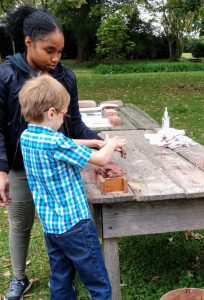How the Division supports educators
Museums love teachers too!
By Vertie Lee, curator of education
At the Delaware Division of Historical and Cultural Affairs, the staff look for ways to make teachers feel appreciated and valued. We want teachers to be able to use our historical resources, book field trips and reach out to staff for information. While we keep academic standards in mind, we want students to experience history. Students should occupy the space that history took place, be able to experience hands-on opportunities and incorporate the past by making connections with their current lives.
How do we create these experiences? First, by making the process easy for teachers. Do you want to plan a field trip? Come see us! First, explore our museums by visiting us online at history.delaware.gov. We have five museums in the three counties of Delaware. Pick which museum you are interested in and reach out through email or phone to the site supervisors for more information.

What should you expect on a field trip? Our field trips give teachers and students a chance to experience history live. That could be a trip to one of the historic courtrooms at the Old State House in Dover or the New Castle Court House Museum. Both courthouses had cases tied to the Underground Railroad. Perhaps your students would like to learn about the history of recorded sound and experience a Victrola in action. The Johnson Victrola Museum is the place for you and your students. Interested in shipwrecks and maritime history? The Zwaanendael Museum in Lewes explores two shipwrecks, the DeBraak and the Roosevelt Inlet shipwreck. In Kent County, the John Dickinson Plantation documents and tells the stories of the tenant farmers, indentured servants, and free and enslaved Black men, women and children who lived, worked and died on the plantation. The staff explores the history of John Dickinson, known as the “Penman of the Revolution,” who was one of America’s founding fathers, who wrote of freedom and liberty for all while holding human beings in bondage.
Perhaps as an educator, you are interested in virtual programming or outreach? We would love to visit you (in person or virtually)! Two examples of virtual outreach include Zwaanendael and the John Dickinson Plantation. During the pandemic, the Zwaanendael Museum took the opportunity to revisit their school programming. Their content is rich in maritime history and marine archaeology. Museum staff developed the At Home Archaeology program so educators could use different elements of their programming. At the John Dickinson Plantation, a virtual outreach program was created to connect English language arts with the discovery of the African Burial Ground.
Another way the Division is interested in supporting our teachers is through professional development. In partnership with the Delaware State Education Association, the Division has created the Diversity in Delaware history webinar series. Beginning in January of 2021, the Division and its partners offer educators topics and resources on broadening history within the classroom.
The Division is interested in making sure our educators, parents and students have the resources to experience history in a variety of ways. For more information or to explore options, please visit our website at history.delaware.gov or contact Curator of Education Vertie Lee at vertie.lee@delaware.gov.


